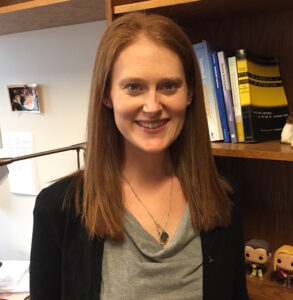
Associate Professor of Communication Elizabeth Johnson-Young
Associate Professor of Communication Elizabeth Johnson-Young presented her paper, “Birth, Trauma, and Communicating Maternal Health” at the annual conference of the Eastern Communication Association in Baltimore, Maryland. The paper was presented during a panel hosted by the Health Communication division focused on maternal and reproductive health. The paper focused on birth choices, experiences, and perceptions of traumatic or challenging birth experiences. Maternal and postpartum health is a topic of importance in the United States, given increasing maternal mortality rates (MacDorman, Declercg, Cabral, & Morton, 2016), recognition of factors involved in postpartum depression and anxiety, and increasing rates of inductions and cesarean births (c-sections) despite the risks that come with them (Betran et al., 2018; Sandall et al., 2018). Birth trauma and psychological responses to birth trauma most often refer to situations in which the mother’s or child’s life is put at risk (i.e. NIH, 2013); however, a simple search on social and popular media reveals a host of other experiences women may have that they define as traumatic, the consequences of which can impact their mental health, who they trust when it comes to their maternal healthcare, and future decisions regarding birth. The project addressed the research question: What communication choices and strategies do women use after a negative birth experience? Using in-depth, semi-structured interviews of women who personally define their birth experience as difficult or traumatic, the paper discussed the potential consequences of listening, language, and support.
Assistant Professor of Communication Adria Goldman, and Professor of Communication and Communication and Digital Studies Department Chair Anand Rao also presented at the conference on March 30, 2023. Their panel, Collaborative Team-Based and Experiential Learning as a Path to Student Innovation in Communication, which included Johnson-Young, explored examples and lessons from team-based collaborative learning experiences from multiple institutions. During the interactive discussion, panel members brought expertise from their classrooms and roles in their school that demonstrated purposeful collaborative learning. In each of the cases, a focus on student engagement with one another and the outside community was key, as students learned to situate themselves as communication scholars and practitioners. UMW presenters shared examples and ideas from Visual Rhetoric, Senior Seminar in Digital Rhetoric, and Small Group Communication. Panel members from other institutes presented projects from courses such as Public Relations and Game Design.